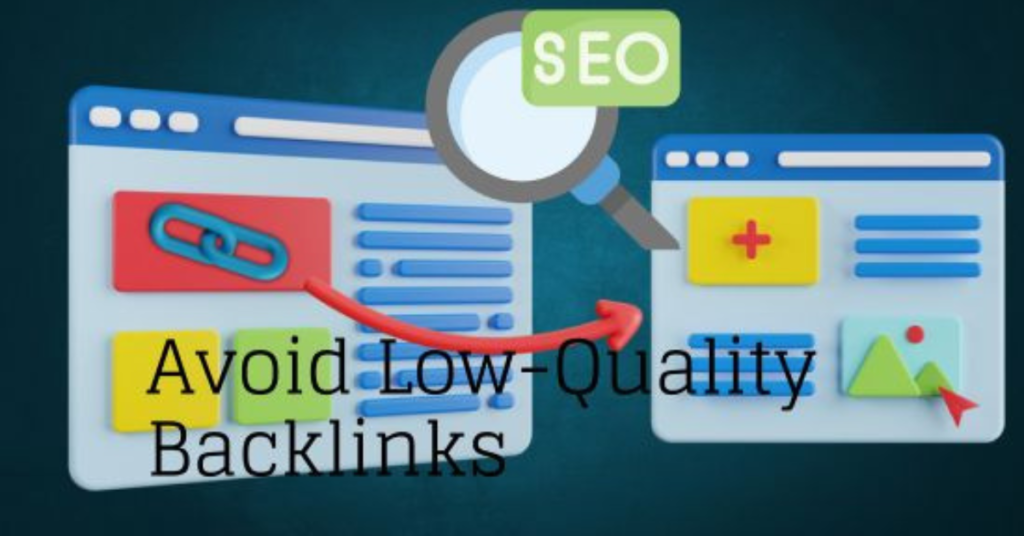Steering clear of low-quality backlinks is crucial for maintaining an effective SEO strategy. This is because poor-quality backlinks can significantly affect your website’s ranking and reputation.Such as undesirable links are unconnected and spammy that are potentially obstruct your website’s development and prompting to search engines.
As you know, backlinks are essential for a website’s credibility and visibility. Consequently, low-quality backlinks negatively impact the performance of the website. This article will teach you how to steer clear of poor-quality backlinks.
Identifying Low-Quality Backlinks

In the intricate realm of search engine optimization (SEO), the quality of backlinks can greatly influence the objectives of your website. These low-quality backlinks could waste your efforts and possibly result in penalties from search engines. Let’s examine how to identify low-quality connections and respond accordingly.
Relevance and Context
A key sign of a poor-quality backlink is the lack of relevance to your content or niche. If the linked website’s content and target audience don’t match yours, the link may appear forced and inappropriate. Search engines can alert users regarding possible manipulation of these meaningless links.
Authority of the Link Source
The website’s authority is highly regarded. Links are more valuable that connects to the reliable, respected websites than the spammy or unknown sites. If the connection is weak or questionable, its quality may be low.
Manipulation of Anchor Text
Overly precise keyword optimization of anchor text can be a misleading strategy. The anchor text of organic links includes general and brand-specific terms. Focusing excessively on keywords might be a trick to influence search engine rankings.
Networks and Link Farms
These networks function solely to artificially boost connection metrics. Search engines can identify these tactics. If the linked site is part of a dubious network, it’s advisable to eliminate the link to prevent any possible consequences.
Spam and Poor-Quality Content
To evaluate the quality of the link that you use the backlink for your sites. Content that is badly crafted, unrelated, or filled with spam undermines the credibility of your website. Links from poor-quality sources might harm your credibility, as search engines aim to present users with meaningful and worthwhile content.
Metrics for User Engagement
Even though it doesn’t directly contribute, user engagement analytics could be beneficial in identifying low-quality backlinks. The origin of a backlink may not be relevant to your content if it has a high bounce rate or if visitors spend minimal time on your site, potentially indicating a low-quality link.
Strategies to Avoid Low-Quality Backlinks

Focus on High-Quality Content
Creating Valuable, Relevant, and Engaging Content is the key to naturally acquiring High-Quality Backlinks. If your content is reliable and helpful, it is more likely to be linked by other websites.
Earn Links Organically
Rather than proactively pursuing backlinks, allow them to flow to you organically. When your content is valuable, other websites will quickly reference or link to it as a resource.
Stay away from Link Farms
Steer clear of link farms, as they are online networks established only for generating backlinks. Google punishes sites associated with link farms.
Using Guest Posts Caution
Ensure that the sites where you guest blog are credible and pertinent.A good way to get backlinks is through guest posting. Refrain from frequently utilizing exact-match anchor texts in guest posts.
Check Domain Authority
Utilize instruments such as Moz’s Domain Authority or Ahrefs’ Domain Rating to evaluate the caliber of possible backlink sources. Be mindful of websites that have a greater domain authority.
Relevancy Is Important
Links from sites within your industry or sector are considered more significant. Strive to obtain backlinks from pertinent sources for the situation.
Diversify Your Anchor Text

Avoid using the same anchor text multiple times. To enhance the natural appearance of your backlink profile, mix up your relevant anchor phrases.
Social Signals
Social media shares might not directly influence SEO. However, they might indirectly enhance your website’s visibility and likelihood of acquiring high-quality backlinks.
Regularly Check Your Backlink Profile
Employing tools such as SEMrush, Ahrefs, or Google Search Console. Any low-quality or spammy backlinks you come across must be disavowed.
Focus on Local Links
Search for backlinks from commerce chambers, local directories, and other pertinent community websites if you manage a local business. They could be beneficial for local SEO.
Check Site Relevance
Verify whether the websites linking to you are suitable and trustworthy. Untrustworthy or irrelevant websites could negatively impact your SEO.
Avoid Automated Link Building
Regularly employing automated link-building tools or services often results in inferior backlinks. Employ exclusively manual and natural techniques.
Verify User-Generated Content

If your website permits user-generated content, ensure it is regulated to avoid spam or subpar links from showing up.
Build Relationships
Engage in discussions on forums, communicate with peers in your field, and work together on projects. Authentic relationships can result in organic and valuable backlinks.
Conclusion
The importance of backlinks is clear in the context of search engine optimisation. Nonetheless, the quality of these relationships influences their success. Backlinks of poor quality might undermine your SEO efforts and damage the reputation of your website. Maintaining awareness and pro-activity is crucial to steer clear of these dangerous relationships.
Keep in mind that the foundations of an effective SEO campaign are trustworthy links and valuable, relevant content. Concentrate on establishing authentic relationships with individuals in your field, producing worthwhile content, and performing regular backlink assessments to maintain the quality of your link profile.
FAQs
Q1: What exactly are backlinks?
Backlinks, also known as inbound or incoming links, are hyperlinked referrals to your website from other websites. They are essential for SEO because they offer search engines trust and credibility.
Q2: In what way do poor-quality backlinks influence my website?
Backlinks of poor quality leading to spammy or unrelated content can negatively impact your website’s SEO. Search engine penalties can negatively impact your website’s reputation and rankings.
Q3: Is it possible to eliminate backlinks directed at my website?
You definitely can. If you encounter any low-quality or poor backlinks, you can request that web designers eliminate them. If that’s not feasible, you can utilize the disavow tool to instruct search engines to disregard those links when analyzing your website.
Q4: What sets follow links apart from nofollow links?
Links that often appear and transfer authority, influencing SEO outcomes, are known as “follow links.” Nonetheless, links labeled with the “nofollow” attribute do not affect search engine rankings. They are commonly utilized for content created by users or for commercial purposes. Nonetheless, certain types of no-follow are essential. Certain trustworthy websites offer a no-follow link.
Q5: Is it always essential to disavow backlinks?
Not all backlinks require disavowal. If you possess a significant amount of detrimental or potentially harmful backlinks that you cannot eliminate by yourself, it is recommended. Nonetheless, using appropriate link-building strategies and conducting frequent audits can help in avoiding the necessity for disavowal.

